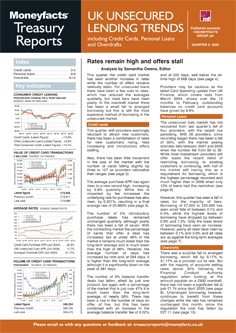Rachel Springall, Finance Expert at Moneyfacts, said:
“Borrowers hoping to consolidate their debts may be disappointed to see a rise in the cost of an unsecured personal loan, with average rates hitting a six-month high. A loan remains an ideal choice for those who want a fixed monthly repayment plan and to know exactly when their debts will be repaid. It is worth noting that loan rates can rise and fall due to either seasonal reasons or risk appetite, so a slight rise should not deter consumers from fixing their finances. However, loans are not as flexible as using a credit card, so there will still be consumers who prefer to move multiple debts onto one card by making a balance transfer.
“Balance transfer credit cards have seen improvements over recent months, with a variety of providers improving 0% offers - good news for those looking to give themselves a bit more breathing space. Between the start of June and the start of September, HSBC, MBNA, Tesco Bank, Barclaycard and NatWest increased the 0% balance transfer offers on selected cards to 34 months. This trend of extending 0% offers is unlikely to wane in the coming weeks, as the festive season is fast approaching and there will be borrowers who use cards to make the expense more bearable. However, the lengthy 0% introductory balance transfer term is not the only consideration of moving debts, as consumers must be comfortable with any upfront fee. Over the past three months, the average balance transfer fee has slightly risen to 2.51%, which means to move a debt of £3,000 would cost £75.30 right now, but some of the longest 0% transfer cards charge much more upfront.
“A recent study by UK Finance revealed that over the 12 months to June, outstanding balances on credit card accounts grew by 6.6% and 47.8% incurred interest. It is vital borrowers make sure they only turn to short-term credit, such as a credit card or overdraft, as temporary support to cover unexpected expenses. It remains essential for consumers to pay more than the minimum on any credit card and to switch to a 0% deal if they need more time to get on top of their debts, especially as the average credit card purchase APR stands at a record high of 35.7% APR. According to the Money Charity, supported by Vanquis Bank, the average credit card debt per household stands at £2,612. This debt could be cleared by using a 0% balance transfer card in two years if someone repaid £115 every month.”
Rachel Springall, Finance Expert at Moneyfacts, said:
“Borrowers hoping to consolidate their debts may be disappointed to see a rise in the cost of an unsecured personal loan, with average rates hitting a six-month high. A loan remains an ideal choice for those who want a fixed monthly repayment plan and to know exactly when their debts will be repaid. It is worth noting that loan rates can rise and fall due to either seasonal reasons or risk appetite, so a slight rise should not deter consumers from fixing their finances. However, loans are not as flexible as using a credit card, so there will still be consumers who prefer to move multiple debts onto one card by making a balance transfer.
“Balance transfer credit cards have seen improvements over recent months, with a variety of providers improving 0% offers - good news for those looking to give themselves a bit more breathing space. Between the start of June and the start of September, HSBC, MBNA, Tesco Bank, Barclaycard and NatWest increased the 0% balance transfer offers on selected cards to 34 months. This trend of extending 0% offers is unlikely to wane in the coming weeks, as the festive season is fast approaching and there will be borrowers who use cards to make the expense more bearable. However, the lengthy 0% introductory balance transfer term is not the only consideration of moving debts, as consumers must be comfortable with any upfront fee. Over the past three months, the average balance transfer fee has slightly risen to 2.51%, which means to move a debt of £3,000 would cost £75.30 right now, but some of the longest 0% transfer cards charge much more upfront.
“A recent study by UK Finance revealed that over the 12 months to June, outstanding balances on credit card accounts grew by 6.6% and 47.8% incurred interest. It is vital borrowers make sure they only turn to short-term credit, such as a credit card or overdraft, as temporary support to cover unexpected expenses. It remains essential for consumers to pay more than the minimum on any credit card and to switch to a 0% deal if they need more time to get on top of their debts, especially as the average credit card purchase APR stands at a record high of 35.7% APR. According to the Money Charity, supported by Vanquis Bank, the average credit card debt per household stands at £2,612. This debt could be cleared by using a 0% balance transfer card in two years if someone repaid £115 every month.”











